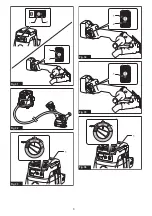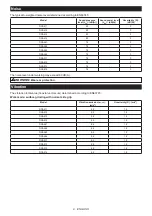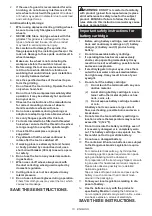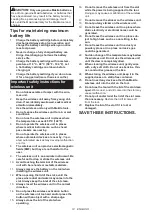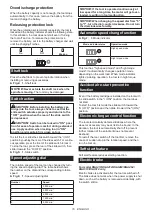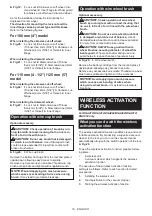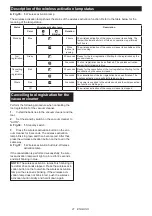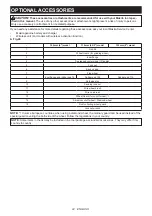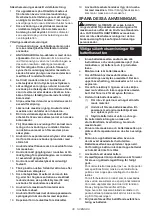
19 ENGLISH
►
Fig.19:
1.
Lock nut
2.
Abrasive cut-off wheel / dia
-
mond wheel
3.
Inner flange
4.
Wheel guard
for abrasive cut-off wheel / diamond wheel
As for the installation, follow the instructions for
depressed center wheel.
The direction for mounting the lock nut and the
inner flange varies by wheel type and thickness.
Refer to the following figures.
For 100 mm (4″) model
When installing the abrasive cut-off wheel:
►
Fig.20:
1.
Lock nut
2.
Abrasive cut-off wheel
(Thinner than 4mm (5/32"))
3.
Abrasive cut-
off wheel (4mm (5/32") or thicker)
4.
Inner
flange
When installing the diamond wheel:
►
Fig.21:
1.
Lock nut
2.
Diamond wheel (Thinner
than 4mm (5/32″))
3.
Diamond wheel (4mm
(5/32″) or thicker)
4.
Inner flange
For 115 mm (4 - 1/2″) / 125 mm (5″)
model
When installing the abrasive cut-off wheel:
►
Fig.22:
1.
Lock nut
2.
Abrasive cut-off wheel
(Thinner than 4mm (5/32"))
3.
Abrasive cut-
off wheel (4mm (5/32") or thicker)
4.
Inner
flange
When installing the diamond wheel:
►
Fig.23:
1.
Lock nut
2.
Diamond wheel (Thinner
than 4mm (5/32″))
3.
Diamond wheel (4mm
(5/32″) or thicker)
4.
Inner flange
Operation with wire cup brush
Optional accessory
CAUTION:
Check operation of brush by run
-
ning tool with no load, insuring that no one is in
front of or in line with brush.
CAUTION:
Do not use brush that is damaged,
or which is out of balance.
Use of damaged brush
could increase potential for injury from contact with
broken brush wires.
►
Fig.24:
1.
Wire cup brush
Remove the battery cartridge from the tool and place it
upside down allowing easy access to spindle.
Remove any accessories on spindle. Thread wire cup
brush onto spindle and tighten with supplied wrench.
NOTICE:
Avoid applying too much pressure
which causes over bending of wires when using
brush.
It may lead to premature breakage.
Operation with wire wheel brush
Optional accessory
CAUTION:
Check operation of wire wheel
brush by running tool with no load, insuring that
no one is in front of or in line with the wire wheel
brush.
CAUTION:
Do not use wire wheel brush that
is damaged, or which is out of balance.
Use of
damaged wire wheel brush could increase potential
for injury from contact with broken wires.
CAUTION:
ALWAYS use guard with wire
wheel brushes, assuring diameter of wheel fits
inside guard.
Wheel can shatter during use and
guard helps to reduce chances of personal injury.
►
Fig.25:
1.
Wire wheel brush
Remove the battery cartridge from the tool and place it
upside down allowing easy access to spindle.
Remove any accessories on spindle. Thread wire wheel
brush onto spindle and tighten with the wrenches.
NOTICE:
Avoid applying too much pressure
which causes over bending of wires when
using wire wheel brush.
It may lead to premature
breakage.
WIRELESS ACTIVATION
FUNCTION
For DGA412/DGA414/DGA462/DGA464/DGA512/
DGA514 only
What you can do with the wireless
activation function
The wireless activation function enables clean and com
-
fortable operation. By connecting a supported vacuum
cleaner to the tool, you can run the vacuum cleaner
automatically along with the switch operation of the tool.
►
Fig.26
To use the wireless activation function, prepare follow
-
ing items:
•
A wireless unit
•
A vacuum cleaner which supports the wireless
activation function
The overview of the wireless activation function
setting is as follows. Refer to each section for detail
procedures.
1.
Installing the wireless unit
2.
Tool registration for the vacuum cleaner
3.
Starting the wireless activation function
Содержание DGA414
Страница 2: ...2 1 3 Fig 1 1 2 Fig 2 1 Fig 3 1 Fig 4 1 Fig 5 1 Fig 6 1 Fig 7 Fig 8 2 ...
Страница 5: ...1 Fig 25 Fig 26 1 Fig 27 2 1 3 4 Fig 28 1 2 3 Fig 29 1 Fig 30 5 ...
Страница 6: ...1 2 1 2 Fig 31 Fig 32 1 Fig 33 1 2 Fig 34 1 Fig 35 1 Fig 36 6 ...
Страница 7: ...1 2 1 2 Fig 37 1 2 Fig 38 1 Fig 39 1 2 5 2 2 11 12 4 3 5 6 7 8 9 10 13 15 3 14 5 3 14 5 3 Fig 40 7 ...
Страница 146: ...146 ...
Страница 147: ...147 ...


